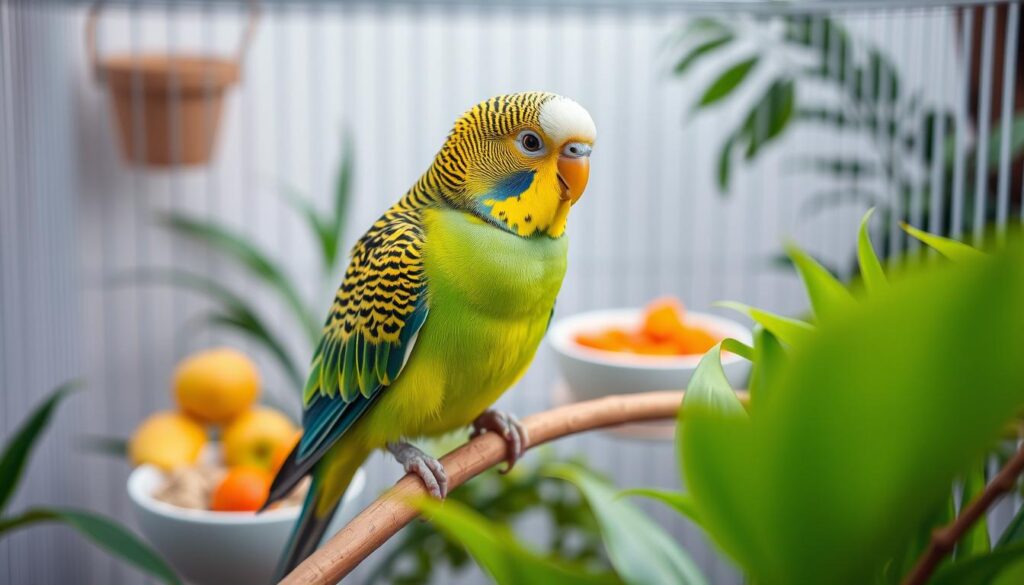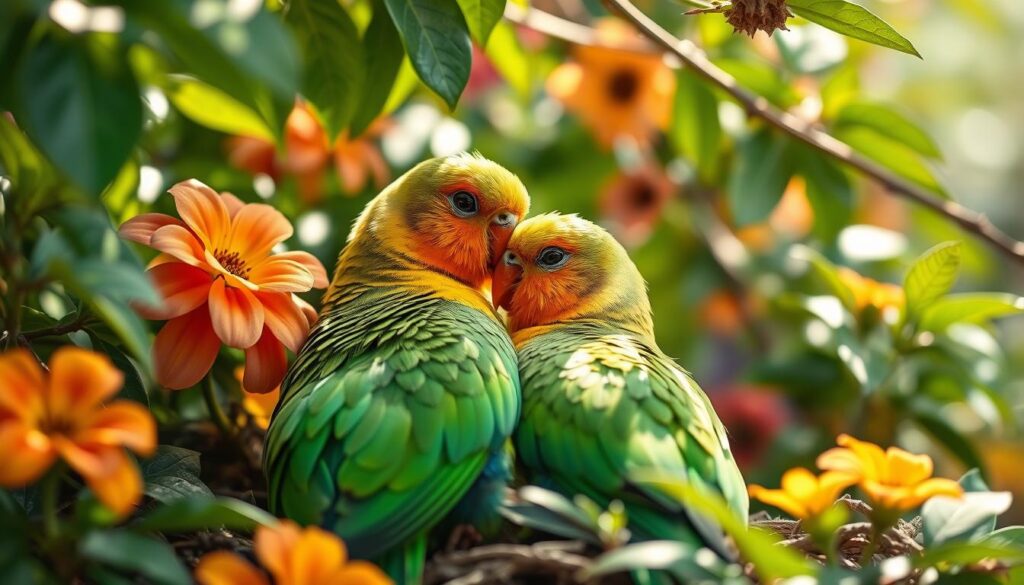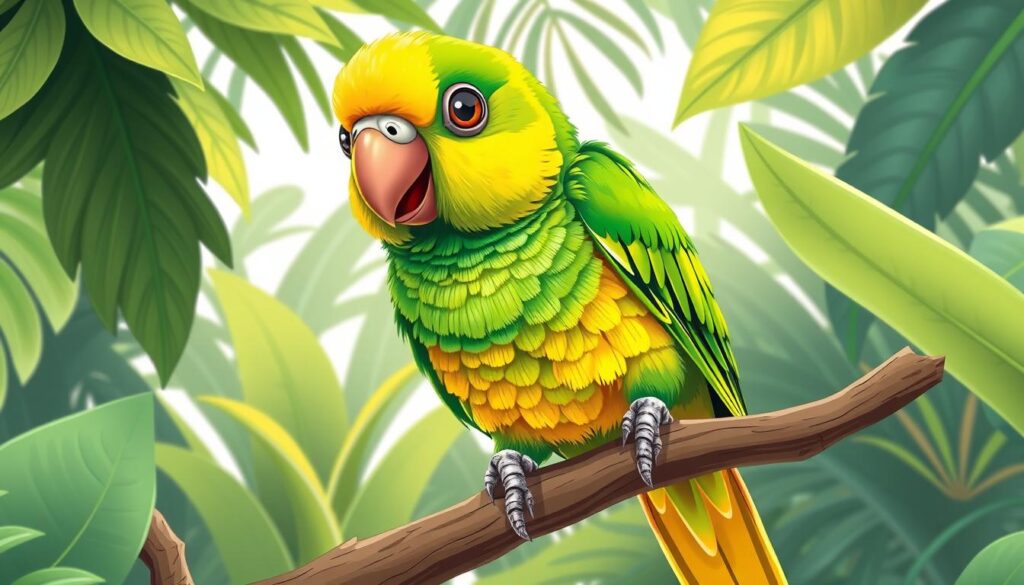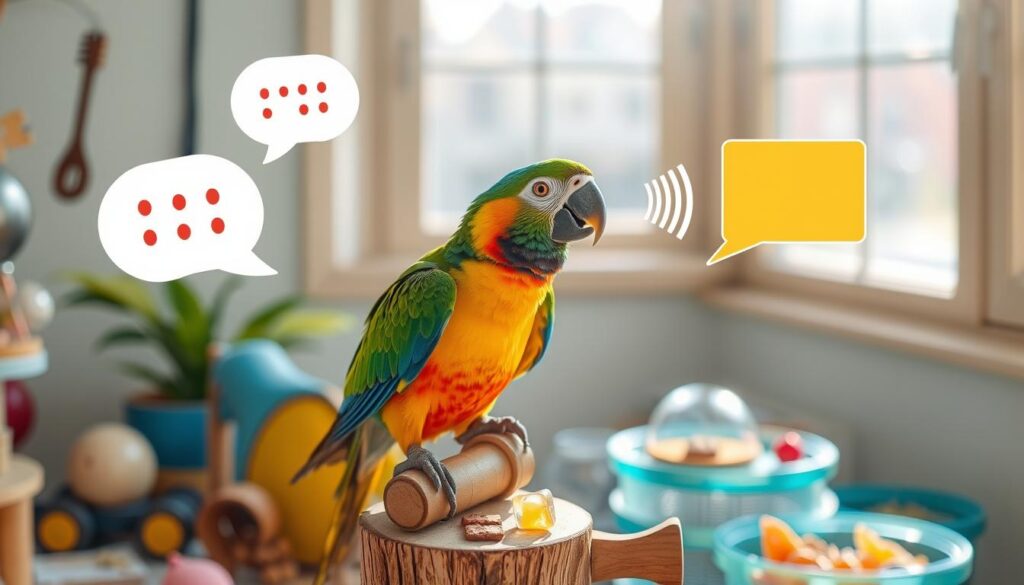Imagine walking into a cozy living room, where the warm sunlight filters through the curtains, casting a gentle glow on a cheerful bird perched happily in its cage. Each morning, the delightful chirps and quirky antics bring smiles to every family member. This was the scene for Alyssa, who decided to adopt her first pet bird after years of contemplating their companionship. Like many beginners, she was drawn to the vibrant personalities and affectionate nature of these creatures. With so many choices out there, she was determined to find the best pet birds that would easily fit into her lifestyle and bring endless joy into her home.
Bird ownership can be incredibly rewarding, but selecting the right species is crucial for a fulfilling friendship. This guide explores the best pet birds for beginners, diving into the top 5 species to help you identify your perfect match. Whether you’re captivated by the playful Budgie or the charming Cockatiel, understanding what makes these species stand out as the best pet birds is key to starting your journey.
Through this article, you’ll gain essential insights on care requirements, personalities, and everything you need to know about choosing the best pet birds for your home. Prepare to discover how these feathered companions can brighten your days and bring lasting joy.
Key Takeaways
- Choosing the right bird is vital for a successful pet ownership experience.
- Each species has unique care requirements and personalities.
- Consider your lifestyle, space, and time commitment before adopting a pet bird.
- Birds can provide companionship and entertainment for years to come.
- Understanding common misconceptions can help set realistic expectations.
Introduction to Bird Ownership
Bird ownership offers a delightful and rewarding experience. Many people find that the benefits of keeping birds go far beyond simple companionship.
Birds are entertaining, curious, and engaging, making them wonderful companions for families and individuals alike. Their playful antics and unique personalities can bring joy to any household.
However, while some may perceive birds as low-maintenance pets, misconceptions about their care and needs are common. Proper understanding of these factors is essential for anyone considering bringing a feathered friend into their home.
By learning what it truly takes to care for birds, you can ensure a happy, healthy, and fulfilling relationship with your avian companion.
The Benefits of Keeping Birds as Pets
One of the primary attractions to bird ownership is the companionship they provide. Birds exhibit unique personalities and can become affectionate and playful friends, which is why they are often considered among the best pet birds for families and individuals alike.
Compared to dogs and cats, many of the best pet birds require less maintenance, making them a practical and rewarding choice. With proper care, these feathered companions thrive and form strong bonds with their owners.
Their relatively small size is another reason why the best pet birds are easy to house, though they still need adequate space to fly and explore.
Choosing from the best pet birds ensures you’ll enjoy the lively atmosphere and joy they bring into your life, creating a truly rewarding pet ownership experience.
Common Misconceptions About Pet Birds
Despite their growing popularity, several common misconceptions about pet birds persist. Many believe that these pets are completely independent and require minimal attention. This is far from the truth, as birds thrive on social interaction and mental stimulation. Another misconception is that they are noiseless companions. In reality, many bird species are known for their vocalizations, which can range from sweet chirps to loud calls. Understanding these common misconceptions about pet birds will help prospective owners make educated decisions.
How to Choose the Best Pet Birds for Your Lifestyle
Before deciding which bird to bring into your home, it’s important to assess your lifestyle and living environment. This evaluation helps ensure you choose one of the best pet birds suited to your needs.
Factors such as space, time commitment, and activity level play a significant role in determining the best fit. Smaller birds, like parakeets, are often considered among the best pet birds for compact living spaces, while larger species may require more room to thrive.
By understanding how to select one of the best pet birds that aligns with your daily routine, you can build a fulfilling and harmonious relationship with your feathered friend.
Budgerigar (Budgie)
Budgerigars, commonly referred to as budgies, are a favored choice for those considering bird ownership, especially families with children. Their friendly and social nature makes them stand out as one of the best pet birds for beginners.
These small, colorful birds are not only visually appealing but also relatively easy to care for. This combination of charm and low-maintenance needs solidifies their place among the best pet birds for anyone looking to start their journey into avian companionship.
Overview of Budgies as Pets
Known for their sociable temperament, budgies can quickly become tamed with regular handling. Unlike some other bird species, they are generally less noisy, fitting well into various living environments. Potential owners often appreciate their adaptability and ease of bonding, which boosts their popularity among novice bird keepers. Their playful demeanor and ability to learn simple tricks contribute to the enjoyable experience of bird ownership.
Care and Feeding Requirements
Proper Budgerigar care involves providing a balanced diet rich in seeds, fruits, and vegetables. Regular access to fresh water is equally essential. For those new to bird ownership, maintaining cleanliness in the birdcage and ensuring ample space for exercise are critical components of budgie care. A stimulating environment equipped with toys can help prevent boredom and foster a happy, healthy bird.
Pros and Cons of Keeping Budgies
The pros and cons of Budgies highlight their advantages and challenges. On the positive side, they are sociable, affectionate, and generally low-maintenance pets. Their small size and limited noise levels appeal to various households. Conversely, potential downsides include occasional loudness and the need for social interaction to thrive. Understanding these factors can help prospective owners gauge their suitability as pets.

Cockatiel
Cockatiels are beloved for their charming personalities and playful nature. Recognized for their delightful vocalizations and affectionate demeanor, these birds make excellent companions. Their engaging Cockatiel characteristics include a distinctive crest, vibrant colors, and a gentle temperament, which appeal to both novice and experienced bird enthusiasts.
Characteristics That Make Cockatiels Great
Known for their friendly disposition, cockatiels can form strong bonds with their owners. They often display endearing behaviors, such as whistling tunes and dancing, which can entertain families. With a typical lifespan of 15 to 20 years, some exceptional individuals even reach 30 years, making them long-term companions worth caring for.
Socializing and Training Your Cockatiel
Effective training Cockatiels involves patience and positive reinforcement. Start by establishing trust through frequent interaction and gentle handling. Basic training commands, such as “step up,” can enhance your bird’s confidence and strengthen your relationship. Regular socialization helps your cockatiel thrive and remain mentally stimulated.
Health Considerations for Cockatiels
A commitment to health care for Cockatiels is essential for their well-being. Regular veterinary check-ups are crucial to monitor any early signs of health issues. A nutritious diet rich in seeds, fruits, and greens aids in maintaining optimal health. Proper care not only ensures a happy bird but can extend their lifespan.
Educating yourself on the needs of cockatiels prepares you for a rewarding experience as a bird owner. Explore more about popular pet birds and tips on their care through various reliable sources, like this guide, to enrich your understanding of pet ownership.
Lovebirds
Lovebirds are known for their affectionate nature and strong social bonds. Understanding their behavior is essential for effective care and interaction. These small parrots thrive on companionship and can often bond more readily with each other than with humans when kept in pairs. For those who desire a deeper relationship with their Lovebird, having a single bird may foster closer bonding with pet birds over time.
Understanding Lovebird Behavior
Socialization from a young age greatly influences Lovebird behavior. Ensuring your Lovebird is familiar with different people and sounds will promote a friendly demeanor toward others. A hand-raised Lovebird, particularly one obtained from a reputable breeder, will display better tameness. Ideally, a Lovebird should be separated from its parents around 2-3 weeks of age to enhance its potential for bonding.
Ideal Housing and Enrichment
When it comes to housing lovebirds, it is essential to create an environment that fosters social interaction. Placing their cage in the main living area allows them to engage with family members and visitors. Additionally, providing a separate sleeping area at night ensures your Lovebird can rest peacefully while family activities continue. Incorporating a variety of toys and activities will help stimulate their mental and physical well-being, crucial for keeping them happy.

Best Practices for Bonding with Lovebirds
Bonding with a Lovebird requires patience and consistency. Spend time with your feathered friend daily to strengthen your relationship. Use gentle talking and treats to encourage trust. With time and effort, pet owners can develop a loving partnership with their Lovebirds. Engaging in fun practices every day allows for a deeper connection. For additional ways to connect with friends online, check out this resource.
Parakeets
Parakeets, commonly referred to as budgies, are beloved pets recognized for their vibrant colors and cheerful personalities. Their playful and friendly nature makes them great companions, enriching the lives of their owners. Understanding the nuances of parakeet care ensures a fulfilling experience for both the bird and its human family.
What Sets Parakeets Apart as Pets
With a typical length of about 7 inches and a lifespan spanning 7 to 15 years, parakeets are known for their social behavior. They thrive on interaction, making them an engaging choice for bird lovers. Owners often find joy in the antics of their parakeets, fostering a bond that can be both entertaining and rewarding. Their lively disposition and ability to mimic sounds elevate them among pet birds.
Nutritional Needs and Diet Tips
Proper nutrition is crucial for maintaining the health of parakeets. When feeding parakeets, a balanced diet consisting of high-quality seeds, pellets, and fresh fruits and vegetables is essential. Including leafy greens can boost their vitamin intake. Owners should avoid processed foods and ensure a clean supply of fresh water is always available, promoting optimal parakeet care and vitality.
Interaction and Playtime Ideas
Playtime for pet birds significantly enhances their well-being. Out-of-cage playtime provides parakeets an opportunity to explore and interact with their environment. Offering toys, climbing structures, and even socializing with humans can help stimulate their natural curiosity. Engaging activities not only prevent boredom but also strengthen the bond between the pet and its owner.
Conures
Conures are vibrant and engaging birds that bring joy to many households. Their lively personalities and striking colors make them standout companions among pet birds. Responsible ownership includes understanding their unique conure characteristics, which include a playful demeanor and strong social needs. These traits contribute to the lively atmosphere they create in a home.
Why Conures Are Unique Pet Birds
Conures offer an unparalleled experience with their affectionate behaviors. Their playful antics and vocal expressions can instantly brighten your day. This species ranges from sun conures, known for their sweetness, to the feisty green-cheek conures, each bringing its charm to your family. While sun conures may be loud, making them less ideal for very young children, their loving nature generally makes them great companions.
Vocalization and Socialization Tips
Vocalization in conures is something that potential owners should carefully consider. Although these birds delight many with their cheerful sounds, they can sometimes be excessively noisy. Training them to moderate their vocalization is essential for a harmonious household. Regular interaction not only fosters socialization but also reduces any overwhelming noise levels, helping to form a deeper bond. Proper guidance through social situations, especially around children, allows conures to thrive.
Common Conure Health Issues
Understanding conure health care is crucial for ensuring a long and healthy life for these birds, which can live up to 30 years. Common health issues include respiratory infections and dietary imbalances. This highlights the importance of a nutritious diet, preferably with a mix of pellets, fresh fruits, and vegetables. Regular veterinary check-ups are vital in identifying potential health concerns early, ensuring these lovable birds continue to bring joy for decades.

Canary
Canaries stand out as enchanting pets, celebrated for their vibrant colors and melodious songs. Their appeal lies not only in their beauty but also in the benefits of canaries as pets for busy individuals. As low maintenance birds, canaries thrive in cozy settings, making them an excellent choice for those who appreciate a touch of nature without the extensive demands found in some other pets.
The Appeal of Canaries as Pets
One of the primary advantages of choosing a canary is their relatively low social needs. Unlike more interactive bird species, canaries are content with gentle environments and do not require constant companionship. This characteristic makes them ideal for individuals who may work long hours and seek a delightful companion that remains happy with minimal interaction.
Creating a Suitable Habitat for Canaries
Establishing an optimal canary habitat is crucial for their well-being. A small yet spacious cage offers enough room for movement, while perches and toys can provide enrichment. Aim for a cage that allows for flying, as canaries enjoy short bursts of flight. Keeping the environment clean and comfortable ensures your pet can thrive for up to 10 years, the average lifespan of these charming birds.
Canary Care and Maintenance Tips
Effective canary care includes providing a balanced diet consisting of high-quality seeds and fresh fruits. A regular feeding schedule fosters healthy habits. Additionally, setting a cleaning routine maintains a hygienic habitat. Understanding the specific needs of your canary allows you to maximize its quality of life, ensuring it enjoys its days in a vibrant and happy environment. For those interested in efficient packing for travel, discover essential travel items that can simplify life on the go.
Conclusion: Making the Right Choice for You
Choosing the right bird is essential to ensure a harmonious bond between you and your feathered friend. The summary of pet birds discussed in this article highlights varied options for beginners, from the sociable Budgerigar and affectionate Lovebirds to the melodious Canaries and playful Conures. Each species offers unique characteristics and care requirements that align differently with individual lifestyles and preferences.
Recap of Key Points
As outlined, Parakeets and Cockatiels make excellent companions for families and individuals seeking low-maintenance pets. They thrive on attention and interaction, which is crucial for their well-being. On the other hand, Lovebirds are highly social, flourishing best in pairs, while Conures bring lively personalities but require experienced care due to their vocal nature. Lastly, Canaries are simple to maintain, appealing for those who appreciate beautiful songs without needing a companion bird.
Final Thoughts on Adopting a Pet Bird
Adopting a pet bird should be a thoughtful decision centered around your available time, living environment, and willingness to engage with your bird. Regular care routines including proper diet, grooming, and social interaction are vital for a healthy and happy bird. By matching your lifestyle to the specific needs of the bird species you wish to adopt, you can create a joyful companionship that lasts for years to come.











